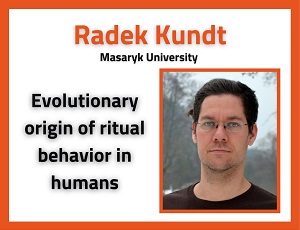
BIO
Radek Kundt is an assistant professor at the Department for the Study of Religions, Masaryk University, where he also act as director of LEVYNA – Laboratory for the Experimental Research of Religion and executive board member of HUME Lab – Laboratory for Experimental Humanities. Employing evolutionary models, he studies religious behaviour in terms of intragroup cooperation and treats ritual as a communication technology.
He argues that ritual behaviour evolved to afford group coordination harnessing the commitment signalling to enhance mutual trust and to identify free-riding individuals.
Combining methods from experimental anthropology and experimental psychology, he conducted research on effects of religious priming on prosocial and moral behaviour.
He has several years of laboratory and field research experience in Mauritius and in Czech Republic.
TITLE OF THE TALK
Evolutionary origin of ritual behavior in humans.
ABSTRACT
Treating collective ritual as a complex signalling system facilitating mutualistic cooperation, together with Martin Lang, we propose an evolutionary model of its origin in the hominin lineage. In our model, we first synthesize the literature dealing with hunter-gatherer ethnography and hominin archaeology and identify similarity signals, coalitionary signals, and signals of commitment to collective action as the main building blocks of the signalling system. Subsequently, we turn to primatology and palaeoanthropology to trace these signals in both non-human primates and past hominins. Adding the proximate level to our analysis, we pinpoint distinctive neurocognitive mechanisms scaffolding the three types of ritual signals and track down their presence. Eventually, we connect this evidence with the prevalent socio-ecological pressures for cooperative communication and suggest that by the arrival of H. Sapiens collective ritual had already been selected for as a crucial adaptation overcoming collective action problems.
